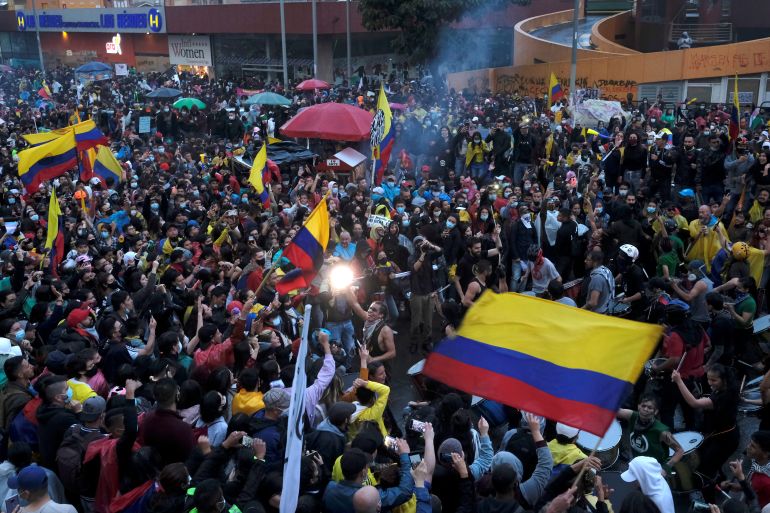Colombia to ‘modernise’ police after protest violence criticism
Security forces in Colombia have been accused of using excessive force during nationwide anti-government protests.

Colombian President Ivan Duque has announced plans to “modernise” the country’s police force, including providing human rights training and increased oversight for officers, as his government faces criticism over the use of force against protesters.
Anti-government demonstrations have taken place across Colombia since late April, when thousands poured into the streets against a now-withdrawn tax reform proposal that critics said would disproportionately harm the middle and working classes.
Keep reading
list of 4 itemsWhat’s behind Colombia’s month of mass protest?
Colombia deploys military to Cali as protester death toll mounts
UN rights chief urges independent probe into deaths in Colombia
Huge rallies have continued, with protesters expanding their list of demands to include health and educational reforms, among other things – while violence has escalated, especially in the city of Cali, the protest epicentre.
The exact death toll linked to the protests remains disputed, but human rights groups say dozens of people have been killed by security forces. The attorney general’s office says 20 deaths are linked directly to the demonstrations.
During a ceremony to celebrate police promotions on Sunday, Duque said his government would ask Congress to approve the creation of a police human rights directorate, which will seek international help on policy, and a new education directorate for officer training.
Duque said he ordered the creation of “a decree that will modernise the structure of the national police, especially to strengthen the policy … on human rights”.
“In this structure the protection, prevention and respect for human rights will be marked because in the national police a directorate of human rights will be created,” said the president, who added that support for human rights should be given all institutional backing “today more than ever”.
The law, to be proposed on the first day of the next legislative session in July, would also create a new complaints system and expanded disciplinary standards for officers, overseen by an independent centre.
The government is also working on a law to establish legitimate use of force criteria and another to regulate the use and sale of less-lethal weapons, Duque said.
Without specifically yielding to protesters’ demands for police “reform”, Duque promised a “transformation” of the police, which answers to the defense ministry.
The announcement coincides with a visit to Colombia by the Inter-American Commission on Human Rights (IACHR) to investigate protest-related violence. The commission said it plans to hold in-person and virtual meetings with civil society actors in the coming days.

Last Sunday, the United Nations’ rights chief voiced alarm at recent violence in Cali, which left more than a dozen people dead late last month, and called for an independent investigation and accountability for the violence.
“It is essential that all those who are reportedly involved in causing injury or death, including state officials, are subject to prompt, effective, independent, impartial and transparent investigations and that those responsible are held accountable,” UN High Commissioner for Human Rights Michelle Bachelet said in a statement.
Negotiations between Duque’s government and an umbrella national strike committee stalled last week, but are expected to resume on Sunday afternoon. The committee is made up of unions, student groups and other civil society organisations.
Protesters have demanded that Duque denounce excessive force by police and act to address inequities in the country.
Political analyst Jorge Restrepo said on Twitter on Sunday that while the announced reform goes in the right direction, it is “insufficient and late”.